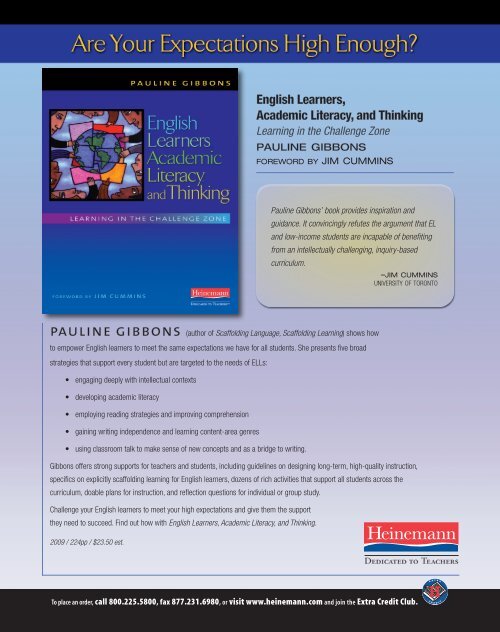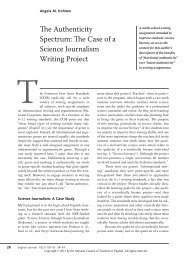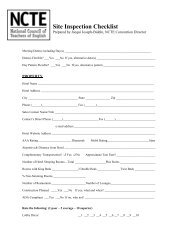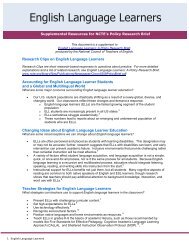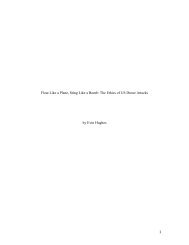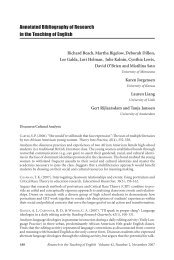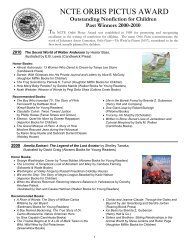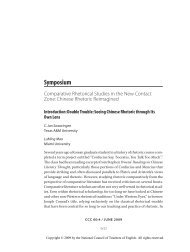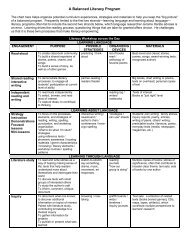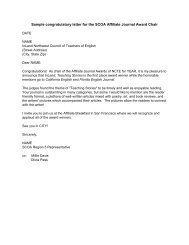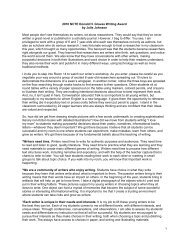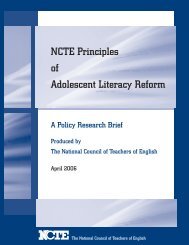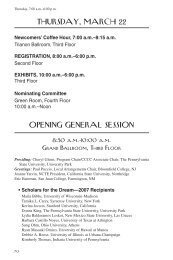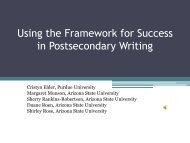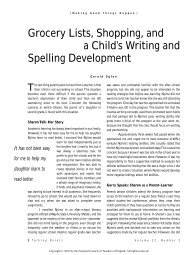English Learners, Academic Literacy, and Thinking - National ...
English Learners, Academic Literacy, and Thinking - National ...
English Learners, Academic Literacy, and Thinking - National ...
Create successful ePaper yourself
Turn your PDF publications into a flip-book with our unique Google optimized e-Paper software.
<strong>English</strong> <strong>Learners</strong>,<br />
<strong>Academic</strong> <strong>Literacy</strong>, <strong>and</strong> <strong>Thinking</strong><br />
Learning in the Challenge Zone<br />
PAULINE GIBBONS<br />
FOREWORD BY JIM CUMMINS<br />
Pauline Gibbons’ book provides inspiration <strong>and</strong><br />
guidance. It convincingly refutes the argument that EL<br />
<strong>and</strong> low-income students are incapable of benefiting<br />
from an intellectually challenging, inquiry-based<br />
curriculum.<br />
–JIM CUMMINS<br />
UNIVERSITY OF TORONTO<br />
pauline gibbons (author of Scaffolding Language, Scaffolding Learning) shows how<br />
to empower <strong>English</strong> learners to meet the same expectations we have for all students. She presents five broad<br />
strategies that support every student but are targeted to the needs of ELLs:<br />
• engaging deeply with intellectual contexts<br />
• developing academic literacy<br />
• employing reading strategies <strong>and</strong> improving comprehension<br />
• gaining writing independence <strong>and</strong> learning content-area genres<br />
• using classroom talk to make sense of new concepts <strong>and</strong> as a bridge to writing.<br />
Gibbons offers strong supports for teachers <strong>and</strong> students, including guidelines on designing long-term, high-quality instruction,<br />
specifics on explicitly scaffolding learning for <strong>English</strong> learners, dozens of rich activities that support all students across the<br />
curriculum, doable plans for instruction, <strong>and</strong> reflection questions for individual or group study.<br />
Challenge your <strong>English</strong> learners to meet your high expectations <strong>and</strong> give them the support<br />
they need to succeed. Find out how with <strong>English</strong> <strong>Learners</strong>, <strong>Academic</strong> <strong>Literacy</strong>, <strong>and</strong> <strong>Thinking</strong>.<br />
2009 / 224pp / $23.50 est.<br />
To place an order, call 800.225.5800, fax 877.231.6980, or visit www.heinemann.com <strong>and</strong> join the Extra Credit Club.
MiddleGround_7x478_Color.indd 1<br />
12/1/2008 11:58:26 AM<br />
NCTE PRESENTS...<br />
Middle Ground<br />
Exploring Selected Literature from <strong>and</strong> about the Middle East<br />
Sheryl L. Finkle <strong>and</strong> Tamara J. Lilly<br />
For years, literature from <strong>and</strong> about the Middle East has largely been missing from middle<br />
<strong>and</strong> high school curricula. Changing demographics <strong>and</strong> global citizenship necessitate a<br />
better underst<strong>and</strong>ing of Middle Eastern history, culture, <strong>and</strong> literature.<br />
Recognizing this need, veteran teachers Sheryl L. Finkle <strong>and</strong> Tamara J. Lilly offer a comprehensive<br />
review of the theory <strong>and</strong> practice of teaching Middle Eastern literature. In this book, they:<br />
• Review principles of multicultural/cross-cultural pedagogy<br />
• Describe principles for selecting quality texts <strong>and</strong> explain the importance of teaching both contemporary <strong>and</strong><br />
ancient literature of the region<br />
• Illustrate how using these texts can engage young readers <strong>and</strong> help develop their language <strong>and</strong> literacy skills<br />
• Provide activities, lessons, <strong>and</strong> materials for various print <strong>and</strong> nonprint texts, including books such as Habibi,<br />
The Kite Runner, <strong>and</strong> Behind the Burqa: Our Life in Afghanistan <strong>and</strong> How We Escaped to Freedom <strong>and</strong> the films<br />
Osama <strong>and</strong> Reel Bad Arabs.<br />
Studying literature from <strong>and</strong> about the Middle East not only enables students to gain a deeper underst<strong>and</strong>ing of<br />
the world around them but also allows them to develop crucial critical thinking <strong>and</strong> literacy skills that can be applied<br />
outside the <strong>English</strong> classroom. 149 pp. 2008. Grades 6–12. ISBN 978-0-8141-3161-9. Theory & Research Into Practice series.<br />
No. 31619 $25.95 member/$34.95 nonmember<br />
To Order: Visit our website at www.ncte.org or call toll free at 1-877-369-6283<br />
THE PROFESSIONAL HOME OF THE ENGLISH LANGUAGE ARTS COMMUNITY
More than one million<br />
Weenies books sold!<br />
Enter the<br />
weird <strong>and</strong><br />
wacky<br />
world of<br />
awardwinning<br />
storyteller<br />
David<br />
Lubar.<br />
Read these<br />
warped<br />
<strong>and</strong> creepy<br />
tales…if<br />
you dare!<br />
978-0-7653-5771-7 • 0-7653-5771-2<br />
Paperback<br />
A boy discovers why pigeons<br />
are always pooping in parks. A<br />
second-grade class learns why<br />
they should be nice to their<br />
math teacher. A young girl<br />
<strong>and</strong> her little brother escape<br />
a campfi re weenie only to<br />
encounter something even<br />
more terrifying….<br />
“ This book will talk itself right off<br />
the shelves, <strong>and</strong> reluctant readers<br />
will devour it.”<br />
—School Library Journal<br />
A town is overrun by road<br />
weenies—a.k.a. joggers—who<br />
never smile. A girl thinks she’s<br />
too old for Halloween…until<br />
she fi nds a special pair of gloves.<br />
A mummy takes his revenge,<br />
one little piece at a time.<br />
A girl doesn’t have a date<br />
for the school dance—until<br />
her dad makes one for her<br />
in his lab.<br />
A family’s Thanksgiving<br />
dinner is interrupted by<br />
a torrent of turkeys out<br />
for revenge.<br />
A princess meets a<br />
pea-brained suitor.<br />
The battle between two<br />
red hot pepper weenies<br />
ends in flames!<br />
FOR AGES 10+<br />
Critically-acclaimed author <strong>and</strong><br />
master of the macabre David<br />
Lubar returns from a journey<br />
into the darkest depths of his<br />
brain with thirty-fi ve more<br />
warped <strong>and</strong> creepy tales.<br />
Don’t be a weenie—pour on<br />
the spice, turn up the heat,<br />
<strong>and</strong> read this book!<br />
In hardcover March 2009<br />
978-0-7653-2099-5 • 0-7653-2099-1<br />
978-0-7653-5325-2 • 0-7653-5325-3<br />
Paperback<br />
“ Lubar strikes again.… He delivers<br />
a series of funny, often surreal<br />
short stories.” —Booklist<br />
The fi rst in the acclaimed<br />
Weenies series! Two remarkable<br />
short story collections—<br />
Kidzilla <strong>and</strong> The Witch’s Monkey—<br />
together, plus several new stories.<br />
“ This hilarious <strong>and</strong> creepy<br />
collection from one of the<br />
masters of YA humor is fi lled<br />
with spine-tingling moments<br />
<strong>and</strong> clever twists.”<br />
—School Library Journal<br />
978-0-7653-4570-7 • 0-7653-4570-6<br />
Paperback<br />
www.tor-forge.com/starscape<br />
www.davidlubar.com
NOW IN PAPERBACK<br />
NEWBERY HONOR BOOK<br />
CORETTA SCOTT KING<br />
AWARD WINNER<br />
WINNER OF THE SCOTT O’DELL AWARD<br />
FOR HISTORICAL FICTION<br />
NCSS/CBC NOTABLE SOCIAL STUDIES<br />
TRADE BOOK FOR YOUNG PEOPLE<br />
★ “ Rich, masterful storytelling. ”<br />
—Kirkus Reviews, starred review<br />
SCHOLASTIC Scholastic Inc.<br />
★ “ A fine, original novel. ” —Booklist, starred review<br />
★ “ Curtis’s talent…is as strong as ever.”<br />
— School Library Journal, starred review<br />
★ “ Irresistible.” — Horn Book, starred review<br />
Grades 4–7 • 368 pages • 0-439-02345-9 • $7.99<br />
www.scholastic.com<br />
PROVEN, WINNING COMPANION TO<br />
(OR SUBSTITUTE FOR) TWAIN’S HUCK FINN<br />
“W<br />
“While creating modules of instruc-<br />
tion for <strong>English</strong> I teachers, I discovered<br />
Finn. I immediately included it as the core<br />
text for our Journeys unit.<br />
Finn will draw<br />
readers into Chloe’s journey in such an<br />
engaging way that students will be able<br />
to make many comparisons not only<br />
to Huck’s legendary journey in Twain’s<br />
Huck Finn, but also to other historical<br />
<strong>and</strong> personal journeys. Finn’s episodic<br />
style will also capture reluctant readers<br />
in ways that foster independent reading.<br />
Whether teachers are teaching their stu-<br />
dents about a classic hero’s journey or<br />
looking for a good book to enrich their<br />
students’ reading lives, Finn will serve them well.” —Dr.<br />
Janet allen, allen eDucational consulting (who maDe Finn part<br />
of 9th graDe core english curriculum for recorDeD Books of<br />
america’s “pluggeD-in to reaDing” program, 9/06)<br />
“Like Huckleberry Finn, Chloe is awakened to injustice <strong>and</strong> hypocrisy,<br />
but also finds hope in good-hearted people, <strong>and</strong> their ability to<br />
connect with others. Students familiar with Huck Finn will appreciate<br />
the many parallels this novel has to the classic … The spirited,<br />
resourceful, observant, <strong>and</strong> witty Chloe is a heroine who will keep<br />
readers engaged <strong>and</strong> interested.”—ncte’s alan review<br />
Finn: A Novel<br />
Approved for ninth grAde english<br />
use stAtewide by sC dept. of ed (2004)<br />
nAmed one of “lA’s best 100 books<br />
for 2001” by lA unified sd<br />
1-890862-14-2, $14.95 (Trade Paperback)<br />
“Set in a thoroughly modern context, this inventive, affectionate homage to<br />
Mark Twain’s classic about Huck Finn clearly illustrates that prejudice still<br />
affects human underst<strong>and</strong>ing, behavior, <strong>and</strong> language… Teens who have read<br />
Twain’s book will appreciate Olshan’s direct references <strong>and</strong> parallels. Those who<br />
haven’t will like the action <strong>and</strong> the heroine’s resourcefulness. The book’s satire<br />
<strong>and</strong> cynicism may create controversy <strong>and</strong> strike some readers as harsh, but the<br />
novel effectively raises awareness of contemporary social concerns, <strong>and</strong>, like the<br />
classic, is certain to invite both thought <strong>and</strong> discussion.”—Booklist, starreD<br />
review<br />
“Teaching Finn alongside Huck Finn brings a new relevance to Twain’s important<br />
<strong>and</strong> much-taught work. I can attest to the powerful connection Finn readers<br />
make with Finn, the novel’s protagonist. This connection allows for a significant<br />
appreciation of the issues <strong>and</strong> conflicts both novels bring to light. Finn is much<br />
more than a complement to Twain’s enduring classic. It gives it contemporary<br />
punch <strong>and</strong> appeal.”—leslie goetsch, chair, english Department, rolanD park<br />
country school<br />
“A contemporary version of Huck Finn <strong>and</strong> a lively <strong>and</strong> captivating novel …<br />
Huck Finn’s creative <strong>and</strong> mischievous spirit soars in protagonist Chloe Wilder,<br />
who follows her own wild adventure in the tradition of one of Twain’s most<br />
memorable characters. … Mark Twain should be proud.”—(ira’s) Journal oF<br />
adolescent & adult literacy<br />
“In American Literature, I teach Finn as an alternative to Huck Finn. I’m<br />
impressed with all the allusions, imagery, <strong>and</strong> other literary devices used to make<br />
this a high quality book for teens.” —carole francis, parker high school,<br />
Janesville, wi<br />
To request a complementary review copy, email<br />
bruceb@bancroftpress.com, <strong>and</strong> provide your name,<br />
school, <strong>and</strong> mailing address. For more information, go to<br />
www.bancroftpress.com/finn.html.
page<br />
6<br />
EDITORS’ MESSAGE | On a Quest for New Discoveries: Effective Professional Development<br />
Calls for Manuscripts<br />
International <strong>Literacy</strong><br />
September 2010. The world is shrinking as globalization<br />
brings us closer to people around the world. We want to widen<br />
the focus of this call to include the following: What kinds of<br />
literacy projects are happening in countries around the world?<br />
What aspects of literacy are currently drawing attention in your<br />
country? What can we learn from your best literacy practices?<br />
How do literacy practices compare across different countries?<br />
We also invite articles from American teachers <strong>and</strong> researchers<br />
that address the following questions: What literacy<br />
projects have you <strong>and</strong> your students engaged in that involve<br />
other countries? How has current technology opened the door<br />
to international literacy practices? What projects have your<br />
students been involved in that support the literacy development<br />
of students in underdeveloped countries? Are you involved<br />
in other international literacy practices, projects, initiatives,<br />
<strong>and</strong> issues that would be of interest to VM readers?<br />
Deadline: September 1, 2009.<br />
Talking about Talk<br />
December 2010. As educators of young adolescents, we underst<strong>and</strong><br />
the importance of the social nature of literacy <strong>and</strong><br />
the role of talk in the classroom. In recent years, our underst<strong>and</strong>ing<br />
of talk has deepened, <strong>and</strong> we have worked consciously<br />
to provide our students with opportunities to share their ideas<br />
with others. As students explore new ideas, participation in<br />
discussion enriches, deepens, <strong>and</strong> exp<strong>and</strong>s their underst<strong>and</strong>ings.<br />
What do students talk about in your classroom? What<br />
does talk look like <strong>and</strong> sound like? How does observing <strong>and</strong><br />
reflecting on this talk inform your teaching? How do you facilitate<br />
rich <strong>and</strong> meaningful talk? How do you invite all students<br />
into the conversation? How does talk inform student<br />
learning in the classroom? Deadline: December 1, 2009.<br />
Honoring Student Voices<br />
March 2011. In the most authentic <strong>and</strong> engaging classrooms,<br />
students feel a sense of ownership <strong>and</strong> responsibility toward<br />
the learning community to which they belong. In this issue,<br />
we are honoring the voices of young adolescents by inviting<br />
them to submit their stories about authentic <strong>and</strong> engaging<br />
literacy experiences. What makes literacy meaningful <strong>and</strong> relevant<br />
to you? What positive middle level literacy classroom<br />
experiences have you had that you want to share with others?<br />
What advice do you have for teachers in the future to make<br />
literacy learning more valuable? Please talk to your students<br />
about these questions <strong>and</strong> help them brainstorm additional<br />
topics. Deadline: March 1, 2010.<br />
Looking Back <strong>and</strong> Moving Forward<br />
May 2011. NCTE <strong>and</strong> Voices have traveled together toward<br />
new underst<strong>and</strong>ings about young adolescents’ literacy <strong>and</strong><br />
learning. As NCTE celebrates its 100th anniversary, we are<br />
taking our final steps as VM’s editorial team. We invite you to<br />
get on board <strong>and</strong> join us as we reminisce about where we have<br />
been <strong>and</strong> as we look to the future for new possibilities. In this<br />
final issue, we reflect on seminal literacy practices of yesterday<br />
<strong>and</strong> seek new <strong>and</strong> evolving ways of helping our diverse<br />
students become strong <strong>and</strong> independent learners. What are<br />
the seminal literacy practices advocated by NCTE that every<br />
teacher of young adolescents should embrace? In looking forward<br />
to the future, what new <strong>and</strong> evolving practices should<br />
we take along? Let’s get “on the road again” (Willie Nelson)<br />
<strong>and</strong> take one final journey together. Deadline: May 1, 2010.<br />
Voices from the Middle, Volume 16 Number 4, May 2009


